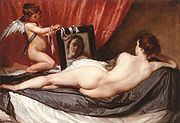
Venus effect
Encyclopedia

.jpg)
Perception
Perception is the process of attaining awareness or understanding of the environment by organizing and interpreting sensory information. All perception involves signals in the nervous system, which in turn result from physical stimulation of the sense organs...
, named after various paintings of Venus
Venus (mythology)
Venus is a Roman goddess principally associated with love, beauty, sex,sexual seduction and fertility, who played a key role in many Roman religious festivals and myths...
gazing into a mirror
Mirror
A mirror is an object that reflects light or sound in a way that preserves much of its original quality prior to its contact with the mirror. Some mirrors also filter out some wavelengths, while preserving other wavelengths in the reflection...
, such as Diego Velázquez's
Diego Velázquez
Diego Rodríguez de Silva y Velázquez was a Spanish painter who was the leading artist in the court of King Philip IV. He was an individualistic artist of the contemporary Baroque period, important as a portrait artist...
Rokeby Venus, Titian
Titian
Tiziano Vecelli or Tiziano Vecellio Tiziano Vecelli or Tiziano Vecellio Tiziano Vecelli or Tiziano Vecellio (c. 1488/1490 – 27 August 1576 better known as Titian was an Italian painter, the most important member of the 16th-century Venetian school. He was born in Pieve di Cadore, near...
's Venus with a mirror, and Veronese
Paolo Veronese
Paolo Veronese was an Italian painter of the Renaissance in Venice, famous for paintings such as The Wedding at Cana and The Feast in the House of Levi...
's Venus with a mirror. Viewers of such paintings assume that Venus is admiring her own reflection in the mirror; however, since the viewer sees her face in the mirror, Venus is actually looking at the reflection of the painter.
This psychological effect is often used in the cinema
Cinematography
Cinematography is the making of lighting and camera choices when recording photographic images for cinema. It is closely related to the art of still photography...
, where an actor
Actor
An actor is a person who acts in a dramatic production and who works in film, television, theatre, or radio in that capacity...
will be shown apparently looking at himself or herself in the mirror. What viewers see is different from what the actor sees, because the camera is not right behind the actor, but the position of the actor is often chosen so that his or her image is nicely framed in the mirror for the camera.
Although the name of the effect refers to a woman, Venus, the effect is more general. A beautiful example in which an animal is seen as looking at itself in a mirror is The Lady and the Unicorn (French: La Dame à la licorne). Note that the effect is about how people interpret the image and this is documented by the Wikipedia entry: "The unicorn kneels on the ground, with his front legs in the lady's lap, from which he gazes at his reflection in the mirror."
Bertamini et al. (2010) conducted additional studies and confirmed that the Venus effect also occurs with photographs, and in real life when the person and the mirror are seen in a room.

